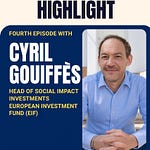Greetings to 3k+ Impact Supporters! 🌍 It’s August Solliv 👋 Today’s article and podcast are part of The Impact Highlight Series - a podcast series that I run with EUVC (Andreas Munk Holm) and ImpactVC/Better Society Capital (Douglas Sloan & Ellie Broad) where we are starting with 10 interviews with some of the most prolific impact investors in Europe. In this series, I don’t write a full article as you have been used to, but you get all the show notes from the interviewee below 🥳
Christian shares how 2150 is building its strategy around deployment readiness—bridging the chasm between early tech and infrastructure-scale solutions. This conversation lays out the economics, urgency, and capital flows reshaping climate tech today—and why adaptation is core to building a livable 2150.
Agenda:
Scaling for the Switch: When Venture Hands Off to Infra
Cooling the Planet: Human Limits, Economic Drivers & Air Conditioning
De-risking for Deployment: The Role of IFC, World Bank & Public Finance
Software for Adaptation Risk: Interdependencies & Insurability
Concrete, Meat & Flying: Where Real Emissions Come From
Why 2150? Long-Termism and Climate Deployment Urgency
Lessons for Climate VCs: Investing with Impact and ROI in Mind
Case Study: Vammo's Electric Scooters & Battery Swapping in Brazil
Open Source Thinking: Sharing Climate Research Across the Ecosystem
A look at the person behind - who is Christian Hernandez?
I bought a poster in Croatia during the summer of 1997 which read “Navigare Necsse Est” which I have since used as my guiding mantra. It was first said by Pompey to his fleet during a storm. I have used it to remind myself that life will never take a straight course, but that even during storms, try to keep the ship pointing in the right general direction
What are climate adaptation’s teething problems?
First, not sure I would use the word "teething" as there are many examples of successful adaptation to climate change. The opening of London's super sewer in the past week is a great example. The challenge lies in two things:
Adaptation is a local response, requiring specific attention to local impacts from climate change. This can make it a very distributed suite of solutions.
Avoided damage or even risk from climate change is a harder concept to build a financial argument around compared to one with a clear revenue stream or financial savings.
How do we find the companies, solutions and projects that meaningfully address climate risks, while offering investors opportunities that can fit within their constraints?
How do we mobilise more VC dollars into adaptation given 94% of climate investment has gone into mitigation
Is it too late for climate mitigation? Are we at a turning point for climatetech VC?
No
Reducing emissions to net zero is the only way we can limit the extent of future extremes and associated risks from climate change.
The world is on a course to overshoot the Paris Agreement's 1.5ºC target by the early 2030s (based on a 10-year average)
Every future 0.1ºC of warming will lead to increasing risks and likely damages from climate change
2150's own report called "Climate 101" shows that impacts from warming are not linear, with large changes to our natural systems and ecosystems health occurring between a 1.5 and 2.0ºC world
There are "tipping points" that we will go over as we get closer to even 2ºC of warming. The possible irreparable loss of Greenland's ice sheet being an example. As a reminder "tipping points" are thresholds that once crossed, we cannot go back within a normal human lifetime.
Understanding all of this, mitigation and limiting warming in line with our globally recognised limits is even more imperative than ever given that we are off course.
Global climate finance flows in 2022 were ~ $1.3 trillion, much less than the average $8.3 trillion per year we expect to need through 2050.
We need to continue to scale climate mitigation finance, and importantly get adaptation investment to a level that's commensurate with the risks we face.
Are there any key criteria when analyzing climate adaptation vs climate mitigations solutions? (e.g. different types of financing, hardware vs software, etc.)
Impact considerations are different. Adaptation is about creating resilience to climate hazards, which relies more on modelling future climate risks to understand the impact achieved through intervention.
A lot of adaptation will look more like infrastructure than venture-backed technologies
The definition of a “true north” for adaptation like CO2e in mitigation is harder to determine
Strongly held belief you’ve recently had to change your mind on
That we will act in coordination as a species to tackle our communal challenge of climate change. Unfortunately at the national and international level there are too many opposing voices
Any other key take-aways on the topic of “Climate adaptation’s teething problems and is it too late for mitigation”?
Disclosing and pricing in climate risk for investors will be essential to accelerate finance for adaptation. Climate risk is financial risk, and the more investors can be informed to understand the extent to which their capital is exposed to those risks will ideally drive better decision making and financial outcomes. …
As the US military themselves pointed our climate change is also a national security risk at home and abroad
Best tip for generalist investors about impact
We are re-inventing economies, supply chains, manufacturing methods. This will be one of the greatest value creation periods in history. That alone should lead any investor to mobilisation
Best tip for impact investors
Come to us for insights on our deep dives - be that cooling or water or cement and concrete. We openly want to share them so that as many solutions as possible are backed and scaled.














Share this post